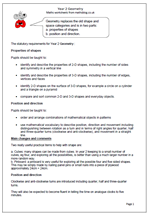 Geometry replaces the old shape and space categories and is in two parts:
Geometry replaces the old shape and space categories and is in two parts:
a. properties of shapes b. position and direction.
The statutory requirements for Year 2 Geometry :
Properties of shapes
Pupils should be taught to:
• identify and describe the properties of 2-D shapes, including the number of sides and symmetry in a vertical line
• identify and describe the properties of 3-D shapes, including the number of edges, vertices and faces
• identify 2-D shapes on the surface of 3-D shapes, for example a circle on a cylinder and a triangle on a pyramid
• compare and sort common 2-D and 3-D shapes and everyday objects.
Position and direction
Pupils should be taught to:
• order and arrange combinations of mathematical objects in patterns
• use mathematical vocabulary to describe position, direction and movement including distinguishing between rotation as a turn and in terms of right angles for quarter, half and three-quarter turns (clockwise and anti-clockwise), and movement in a straight line.
Main changes and comments
Two really useful practical items to help with shape are:
a. Cubes: many shapes can be made from cubes. In year 2 keeping to a small number of cubes, eg four, and exploring all the possibilities, is better than using a much larger number in a more random way.
b. Pinboard: a pinboard is very useful for exploring all the possible four and five sided shapes. This may be simply made by nailing panel pins or small nails into a piece of plywood approximately 24cm × 24cm.
Position and direction
Clockwise and anti-clockwise turns are introduced including quarter, half and three-quarter turns.
They will also be expected to become fluent in telling the time on analogue clocks to five minutes.